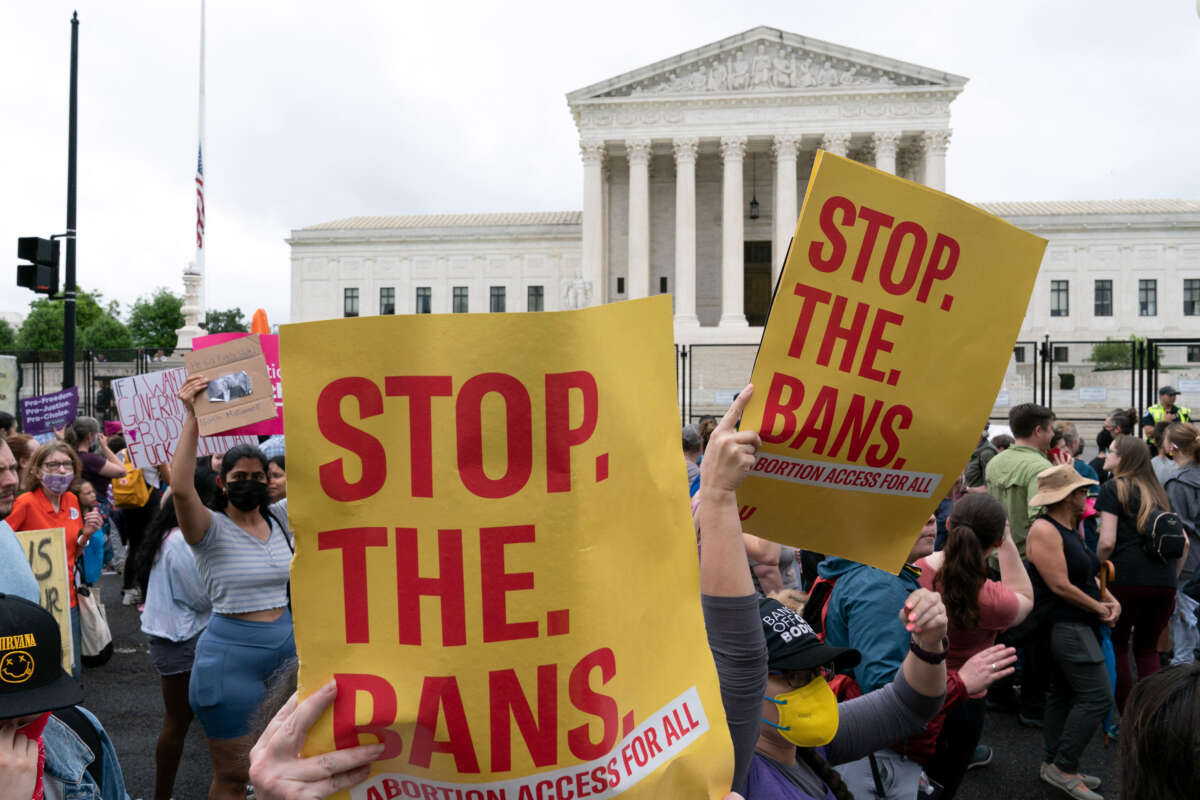Nearly one year to the day that the U.S. Supreme Court overturned federal abortion rights protections by upending precedent established in the 1973 Roe v. Wade decision, new polling shows that most Americans are opposed to the anti-abortion ruling.
The survey, a CBS News/YouGov poll conducted on June 14-17, was published just days before the first anniversary of the Dobbs v. Women’s Health decision.
A draft of the Dobbs decision was leaked in May 2022, a month before the ruling was handed down. When the ruling was officially published by the right-leaning Supreme Court on June 24 of last year, millions of people across the country demonstrated against the decision.
The new poll shows that most Americans maintain their opposition to the ruling a year later.
According to the poll, 56 percent of respondents said they disapprove of the Roe overturn, while just 44 percent said they approve.
Fifty-seven percent of Americans believe that overturning Roe was bad for the country. Among those who said as much, 86 percent said the ruling was bad because it put the health and lives of people who can become pregnant at risk, with 81 percent saying the ruling was harmful because it struck down a recognized constitutional right. Seventy-eight percent said the ruling was bad for the country because it allowed states to restrict abortion access.
Forty-six percent of respondents said being pregnant in the U.S. has become more dangerous as a result of the Court’s decision.
Within a survey of OBGYNs published earlier this week by the Kaiser Family Foundation, more than two-thirds (68 percent) said the Dobbs ruling has made it more difficult to respond to pregnancy-related emergencies. Forty-four percent of OBGYNs said their “decision-making autonomy” has worsened since the Dobbs decision. In states where abortion has been banned or severely restricted, that number goes up to 6 in 10 OBGYNs.
Meanwhile, there have been numerous reports of people being denied access to abortion in medical emergencies since the Roe overturn. In one case, a woman in Tennessee couldn’t obtain an abortion even after her pregnancy was no longer viable and posed a great risk to her health because health care providers were unsure whether she met the standards required to access a life-saving abortion under the law.
That woman, Mayron Hollis, was forced to have a hysterectomy.
“I didn’t want the hysterectomy. But they said that was the only way that they could stop the bleeding to help me, so I didn’t have a choice,” Hollis told ABC News.
Since Roe’s demise, a number of states have enacted stricter laws on abortion, either through automatic trigger laws — which enabled pre-Roe statutes that were still on the books to go back into effect — or through new laws passed by current state legislatures. These laws have created barriers to the procedure and confusion for doctors, who are unsure, in many cases, whether or not they can proceed with a life-saving abortion, a roadblock that puts their patients at risk.
Total abortion bans and bans on the procedure from six weeks of pregnancy onward currently exist in 14 states across the U.S., while a handful of other states have enacted bans ranging from 12 weeks to 20 weeks. In 25 states plus Washington, D.C., abortion is legal without any weekly restrictions.
Some of those states have passed new laws affirming or expanding abortion protections. Over the past year, some state residents have sought to use the political tools available to them to keep abortion rights intact. Voters in California, Michigan and Vermont, for example, have passed ballot initiatives cementing abortion rights in those states’ constitutions, while efforts to deny abortion rights through ballot initiatives have failed in Kentucky and Kansas. Pro-abortion organizers plan to push similar initiatives in other states in the near future.
Press freedom is under attack
As Trump cracks down on political speech, independent media is increasingly necessary.
Truthout produces reporting you won’t see in the mainstream: journalism from the frontlines of global conflict, interviews with grassroots movement leaders, high-quality legal analysis and more.
Our work is possible thanks to reader support. Help Truthout catalyze change and social justice — make a tax-deductible monthly or one-time donation today.
